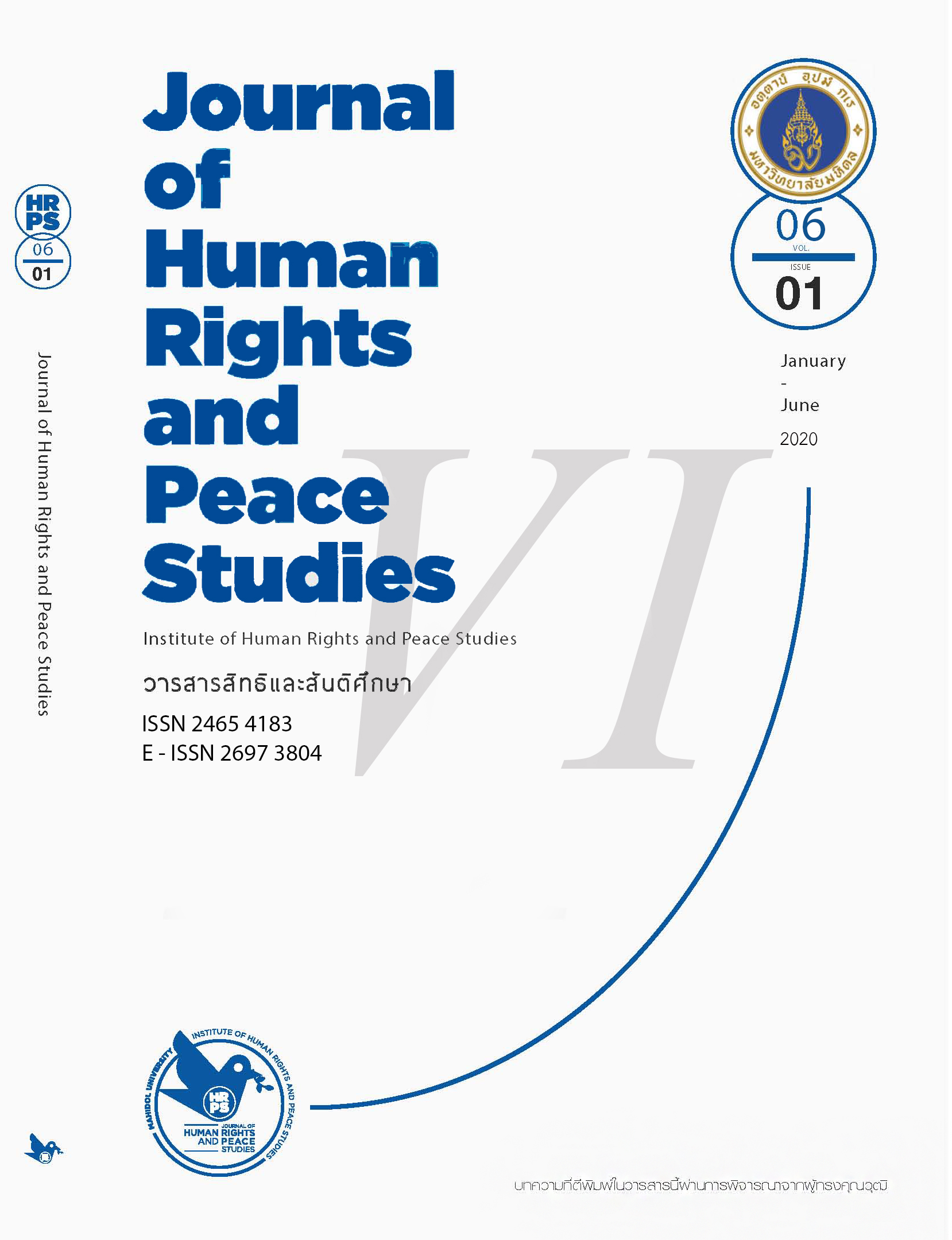The Discourse of Military Domination in Thailand
Main Article Content
Abstract
The paper sought Foucault’s theories and Van Dijk’s CDA approach to conduct a discourse analysis on some military public pronouncements of two prominent military leaders: Prem Tinsulanonda, Prayuth Chan-ocha. The research found that in the discourses social structure is promoted by the military stressing the importance of harmony in society. The idea of harmony is used to create collective happiness and ideally created by the charismatic leader with barami at the top and networks of ‘bunkhun’ (debt of gratitude) at the subordinate level. The paper argues that the networks of bunkhun stress the importance of the collective happiness over the individual which is an obstacle towards a human rights-based society.
Article Details

This work is licensed under a Creative Commons Attribution-NonCommercial-NoDerivatives 4.0 International License.
The views, opinions, and pictures expressed in this journal are those of the authors and do not necessarily reflect the opinions and viewpoints of the editor and the editorial board. All rights are reserved by the authors and the Institute of Human Rights and Peace Studies of Mahidol University. No part of this journal may be reproduced, stored in a retrieval system, or transmitted in any form or by any means without the prior permission in writing from the journal’s editor, or as expressly permitted by law, or under terms agreed with the appropriate reprographics rights organization. Non-commercial use of information in this journal must be properly referenced.
References
Amerian, M., & Esmaili, F. (2015). A brief overview of critical discourse analysis in relation to gender studies in English language textbooks. Journal of Language Teaching and Research, 6(5), 1033-1043. https://doi.org/10.17507/jltr.0605.16
Baker, C. (2016). The 2014 Thai Coup and some roots of authoritarianism. Journal of Contemporary Asia, 46(3), 388-404. https://doi.org/10.1080/00472336.2016.1150500
Bunbongkarn, S. (2015). What Went Wrong with the Thai Democracy? In D. Singh (Ed.), Southeast Asian Affairs 2015 (pp. 359-368). ISEAS–Yusof Ishak Institute.
Chachavalpongpun, P. (2010). "Unity" as a discourse in Thailand's polarized politics. Southeast Asian Affairs, 332-342.
Chaloemtiarana, T. (2018). Kānmư̄ang rabop phō̜ khun ʻuppatham bǣp phadetkān [Thailand: The politics of despotic paternalism] (P. Chatponrak, P. Sirisuk & T. Petchlertanan, Trans.; 5th ed.). The Foundation for the Promotion of Social Sciences and Humanities Textbook Project. (Original work published 2007)
Chan-ocha, P., & Tantipimonpun, V. (2014). Khư̄n khwām suk hai prathēt Thai [Bring back happiness to Thailand]. (Royal Thai Army Orchestra, Performer)
Dijk, T. A. (2015). Critical discourse studies: A sociocognitive approach. In R. Wodak & M. Meyer (Eds.), Methods of critical discourse studies (pp. 62-86). Sage Publications.
Farrelly, N. (2013). Why democracy struggles: Thailand's elite coup culture. Australian Journal of International Affairs, 67(3), 281-296. https://doi.org/10.1080/10357718.2013.788123
Foucault, M. (1980). Truth and power. In C. Gordon (Ed.), Power/knowledge: Selected interviews and other writings 1972-1977 (pp. 109-133). Pantheon Books.
Government Public Relations Department. (2020, March 26). The twelve core values for a strong Thailand. National News Bureau of Thailand. http://nwnt.prd.go.th/link/en/Core_Values/
Hewison, K. (2007). Thailand after the 'Good' coup. The Brown Journal of World Affairs, 14(1), 237-247.
Jackson, P. A. (2004). The Thai regime of images. Sojourn, 19(2), 181-218.
Jory, P. (2002). The Vessantara Jataka Barami, and the Bodhisatta-Kings: The origin and spread of a Thai concept of power. Northern Illinois University Center for Southeast Asian Studies, 16(2), 36-78.
Kasetsiri, C. (2017). Prawat kān mư̄ang Thai Siam B.E. 2475 – 2500 [A political history of Thailand-Siam 1932-1957] (7th ed.). The Foundation for the Promotion of Social Sciences and Humanities Textbook Project.
Lin, A. (2014). Critical discourse analysis in applied linguistics: A methodological review. Annual Review of Applied Linguistics, 34, 213-232. https://doi.org/10.1017/S0267190514000087
Lu, S.-M. (2015). Chinese familism and leadership formation, Mission Studies, 32(1), 87-114. https://doi.org/10.1163/15733831-12341381
Matichon TV. (2019, April 09). Live: Phon ʻēk Prem Tinsulanonda pœ̄t bān sī sao hai nāyok nam khana rot nām khō̜ phō̜n Songkrān [Live: General Prem Tinsulanonda opens his house at Si Sao for the Prime Minister and delegates to join Songkran water blessings; Video]. Youtube. https://www.youtube.com/watch?v=Z7OiRZhKm3c
Persons, L. S. (2008). The anatomy of Thai face. Manusya: Journal of Humanities, 11(1), 53-75.
Phongpaichit, P. (2016). Inequality, wealth and Thailand's politics. Journal of Contemporary Asia,46(3), 405-424. https://doi.org/10.1080/00472336.2016.1153701Phongpaichit, P., & Baker, C. (2016). Introduction: Inequality and oligarchy. In P.
Phongpaichit, & C. Baker (Eds.), Unequal Thailand: Aspects on income, wealth and power (pp. 1-31). NUS Press.
Raymond, G. V. (2018). Thai military power: A culture of strategic accommodation.NIAS Press.
Sajjad, F., Malghnai, M., & Khosa, D. (2018). Language, social media and political identity (re)presentation: A new theoretical framework for the analysis of social media political discourse. International Journal of English Linguistics, 8(2), 199-206. http://doi.org/10.5539/ijel.v8n2p199
Sombatpoonsiri, J. (2017). The 2014 military coup in Thailand: Implications for political conflicts and resolution. Asian Journal of Peacebuilding, 5(1), 131-154.
SpringNews. (2015, February 8). Thāthī phon ʻēk Prem Tinsulanonda lang Kor.Sor.Chor. khao khūapkhum ʻamnāt [General Prem Tinsulanonda after the NCPO seizing power; Video]. Youtube. https://www.youtube.com/watch?v=2w1qs-bmpV0
Thai Khu Fa, Government House. (2018, April 10). Nāyokratthamontrī nam khana ratthamontrī phū banchākān lao thap khao rot nām læ khō̜rap phō̜n čhāk phon ʻēk Prem Tinsulanonda[Prime Minister leads the cabinet, army commanders to join water blessings from Prem Tinsulanonda; Video]. Youtube. https://www.youtube.com/watch?v=uEd34zR27zI
Tinsulanonda, P. (2000). Kœ̄t mā tō̜ng tō̜pthǣn bun khun phǣndin [We are born to return the favor to our fatherland]. Ratthaburutfoundation.https://www.ratthaburutfoundation.com/e-book/book3/
Woodiwiss, A. (2012). Asia, enforceable benevolence and the future of human rights. Sociology, 46(5), 966-981. https://doi.org/10.1177/0038038512451531


